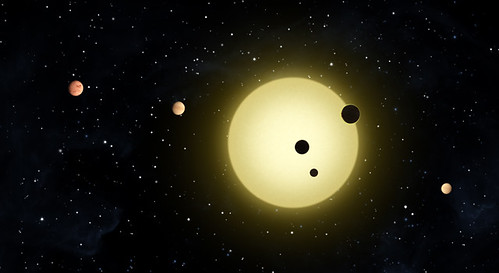You have a website or blog you want to earn money all of this also

Image by NASAblueshift via Flickr
Scientists said that the space telescope Kepler space - who is looking for planets and follow the Department of Aeronautics and Space Administration (NASA) - found 11 groups of new solar, one of the five planets closest to the star around which the mother of Mercury to the sun.
And raises this discovery, announced on Thursday a list of confirmed planets outside the solar system to 729, including 60 attributed to Kepler team. And the telescope can be launched into space in March / March 2009 to detect slight declines - but regular - in the amount of light coming from stars.
The scientists can then determine whether the optical changes due to planets close to the vision of Kepler. The 2300 Kepler discovered another planet waiting for more confirmation.
Not like any of the groups of planets discovered in recent times our solar system with eight planets, but that "Kepler 33" - is the star of the oldest and largest of the sun - has five planets are closer to the star around which the mother of Mercury to the sun.
The range of the planets in size from about 1.5 such as the diameter of the Earth to the five-fold, after the scientists did not specify whether the objects of solid rock like Earth, Venus, Mars, Mercury, or it is full of gas like Jupiter, Saturn, Uranus and Neptune.
Said planetary scientist Jack Lissauer of Ames Research Center NASA, California, the Kepler team discovered a star in the past and one has six confirmed planets and a second of the five planets.
Includes nine new groups of two planets, one of which includes three, bringing the total number of planets detected to 26, all closer to their stars from Venus to the Sun.
And is said to Reuters: "doubled three times the number of stars which we know to have more than one planet Sayyar, so this is what is important here."
The planet Mercury, the closest planet to the sun, followed by Venus and then Earth.
Source: Reuters


No comments:
Post a Comment